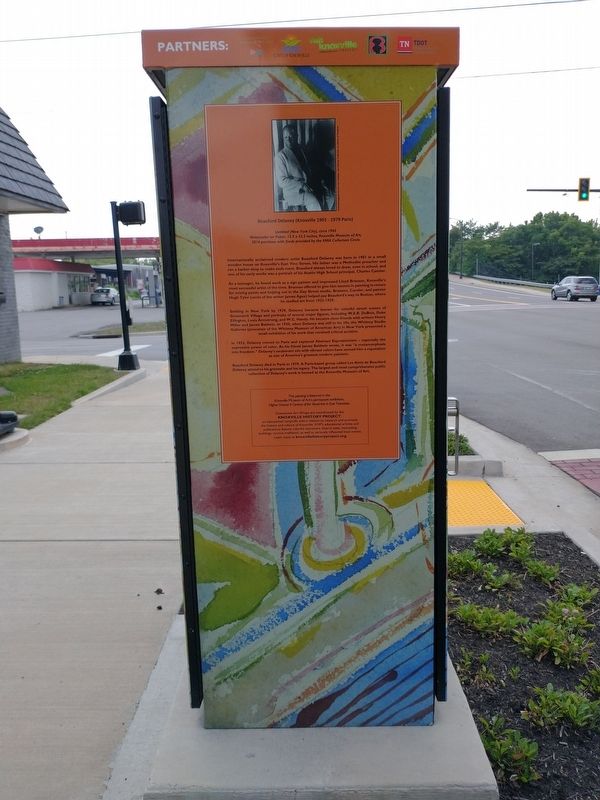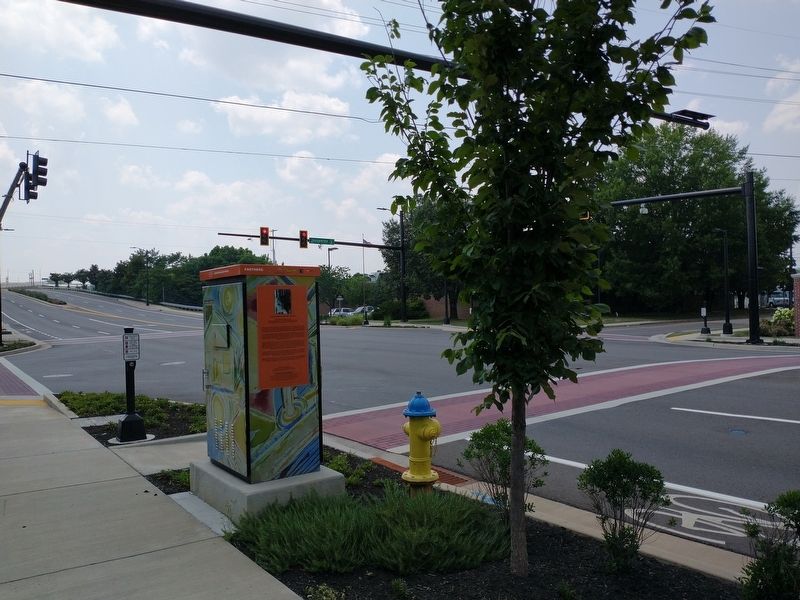Knoxville in Knox County, Tennessee — The American South (East South Central)
Beauford Delaney
(Knoxville 1901-1979 Paris)
Watercolor on Paper, 15.5 x 22.4 inches, Knoxville Museum of Art
2014 purchase with funds provided by the KMA Collectors Circle
Internationally acclaimed modern artist Beauford Delaney was born in 1901 in a small wooden house on Knoxville’s East Vine Street. His father was a Methodist preacher and ran a barber shop to make ends meet. Beauford always loved to draw, even in school, and one of his early works was a portrait of his Austin High School principal, Charles Cansler.
As a teenager, he found work as a sign painter and impressed Lloyd Branson, Knoxville’s most successful artist at the time. Branson offered to give him lessons in painting in return for mixing paints and helping out in the Gay Street studio. Working for Branson and painter Hugh Tyler (uncle of the write James Agee) helped pay Beauford’s way to Boston, where he studied art from 1923-1929.
Settling in New York by 1929, Delaney became known for colorful street scenes of Greenwich Village and portraits of several major figures, including W.E.B DuBois, Duke Ellington, Louis Armstrong, and W.C. Handy. He became close friends with writers henry Miller and James Baldwin. In 1930, when Delaney was still in his 20s, the Whitney Studio Galleries (precursor of the Whitney Museum of American Art) in New York presented a small one-person exhibition of his work that received critical acclaim.
In 1953, Delaney moved to Paris and explored the Abstract Expressionism – especially the expressive power of color. As his friend James Baldwin wrote, it was “a metamorphosis into freedom.” Delaney’s exuberant oils with vibrant colors have earned him a reputation as one of America’s greatest modern painters.
Beauford Delaney died in Paris in 1979. A Paris-based group called Les Amis de Beauford Delaney attend to his gravesite and his legacy. The largest of most comprehensive public collection of Delaney’s work is housed at the Knoxville Museum of Art.
[Captions:]
This painting is featured in the Knoxville Museum of Art’s permanent exhibition, Higher Ground: A Century of Visual Arts in East Tennessee.
Downtown Art Wraps are coordinated by the Knoxville History Project, and educational nonprofit with a mission to research and promote the history and culture of Knoxville. KHP’s educational articles and publications feature colorful characters, bizarre tales, interesting buildings, curious traditions, as well as seriously influential local events. Learn more at knoxvillehistoryproject.org.
Erected by Knoxville History Project.
Topics and series. This historical marker is listed in these topic lists: African Americans • Arts, Letters, Music. In addition, it is included in the Knoxville History Project - Downtown Art Wraps series list. A significant historical year for this entry is 1945.
Location. 35° 58.631′ N, 83° 54.726′ W. Marker is in Knoxville, Tennessee, in Knox County. Marker is at the intersection of East Magnolia Avenue (U.S. 70) and Jessamine Street, on the left when traveling west on East Magnolia Avenue. Touch for map. Marker is at or near this postal address: 1200 E Magnolia Ave, Knoxville TN 37917, United States of America. Touch for directions.
Other nearby markers. At least 8 other markers are within walking distance of this marker. Magnolia Avenue History (here, next to this marker); Ruth Cobb Brice (about 600 feet away, measured in a direct line); a different marker also named Magnolia Avenue History (about 600 feet away); Charles Griffin Farr (approx. ¼ mile away); a different marker also named Magnolia Avenue History (approx. ¼ mile away); a different marker also named Ruth Cobb Brice (approx. 0.4 miles away); a different marker also named Magnolia Avenue History (approx. 0.4 miles away); Knoxville (approx. 0.4 miles away). Touch for a list and map of all markers in Knoxville.
Credits. This page was last revised on July 28, 2021. It was originally submitted on July 27, 2021, by Tom Bosse of Jefferson City, Tennessee. This page has been viewed 121 times since then and 10 times this year. Photos: 1, 2. submitted on July 27, 2021, by Tom Bosse of Jefferson City, Tennessee. • Devry Becker Jones was the editor who published this page.

